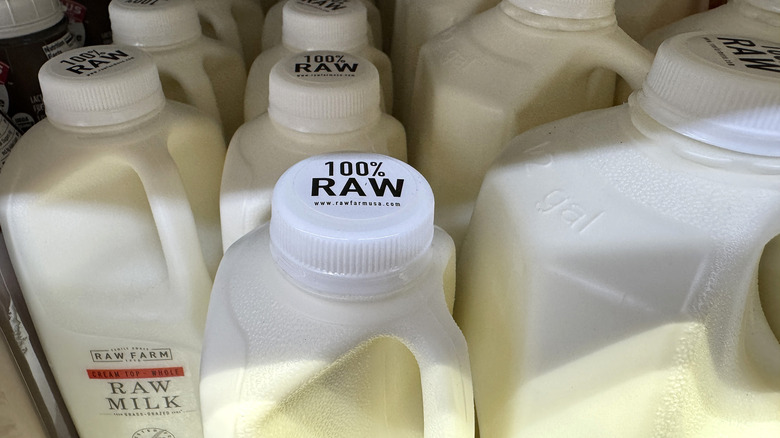What You Won't Find In Robert F. Kennedy Jr.'s Daily Diet (And Red Flags You Will Find)
If you closely follow the news, you might remember Donald Trump Jr.'s Instagram photo that showed him, his father, Elon Musk, and Robert F. Kennedy Jr. enjoying a feast of McDonald's food on Trump's plane. The caption? "Make America Healthy Again starts TOMORROW." A photo of President Donald Trump eating McDonald's food isn't so shocking, but consuming fast food goes against RFK Jr.'s brand. In fact, Kennedy called the food on Trump's plane "poison" with a slim choice between KFC or a Big Mac (via YouTube).
That's probably a good thing, considering he's Trump's pick for Secretary of Health and Human Services. You might also have seen his Instagram posts in which he's doing push-ups shirtless and wearing jeans hoping to get America back into shape. You gotta admit — the guy is ripped, especially for someone who's 71.
So what kind of diet does RFK Jr. follow to get a six-pack? In sum, he prefers natural, unprocessed foods and only eats from noon until 7 p.m. Let's look a little closer at how RFK Jr.'s food choices could affect his health and yours.
RFK Jr.'s diet includes raw milk, no processed foods
As a kid, RFK Jr. loved his Twinkies, and he has said he'd still eat them if they weren't ultra-processed. At one point in time, he told Dr. Mark Hyman in an interview that he was drinking nine Cokes a day. Now he considers ultra-processed food to be one of the biggest contributors to chronic health issues.
(Get the facts about RFK Jr.'s controversial claims about seed oils.)
Scientific evidence supports his claim. A 2020 meta-analysis in the British Journal of Nutrition found that ultra-processed food increases your risk of obesity, a high waist circumference, low HDL cholesterol levels, and metabolic syndrome. Eating more foods like RFK Jr.'s beloved Twinkies is also linked to cardiovascular disease, depression, and vascular diseases of the brain.
RFK Jr. further says he drinks raw milk over pasteurized. Fans of raw milk will say that the enzymes, probiotics, and vitamins make it more healthy than the pasteurized milk you typically see on grocery shelves. However, a 2011 meta-analysis in the Journal of Food Protection found that the nutritional differences between raw milk and pasteurized milk are minor. Additionally, although raw milk goes through a filter before consumption, it isn't heated to kill bacteria such as salmonella and E. coli. The U.S. Food & Drug Administration says that the possible pathogens in raw milk can cause foodborne illnesses, particularly among people with weakened immune systems.
RFK Jr. practices intermittent fasting
RFK Jr. starts his day with a 12-step meeting, followed by a good hike outdoors then meditation. He then hit the weights for about 35 minutes. When is breakfast? Not until noon, and he says he tries to stop eating around 6 p.m., although sometimes that might extend until 7 p.m.
(Read this if you're thinking about intermittent fasting.)
Intermittent fasting is all the rage among younger people, but it could benefit older adults showing cognitive decline. In a 2020 study in Nutrients, researchers tracked 99 older adults with mild cognitive impairment for three years. Those who regularly practiced intermittent fasting lost weight, improved insulin and blood glucose levels, and showed less inflammation. Almost 25% of the intermittent fasters regained normal cognitive function and overall health after three years.
Time-restricted eating and intermittent fasting might also be helpful for healthy older adults like RFK Jr., according to a 2024 systematic review in Preventive Medicine Reports. These practices might help maintain cognitive health and reduce depression as you age while possibly protecting the brain from inflammation associated with neurodegenerative diseases such as Alzheimer's.



